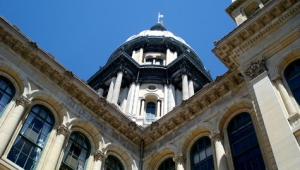
By Illinois Radio Network
SPRINGFIELD – Lawmakers heard from students, parents, advocates and local and state school officials about the policy of schools putting certain students in isolation and restraints.
Two months ago, the Chicago Tribune reported more than 20,000 instances of students being put in isolated timeouts during the 2017-2018 school year. The reporting found many of those cases weren’t properly documented and in some instances not only violated policy, but violated state law.
A former special education student named Joey told a joint Illinois House and Senate committee on Tuesday about his experience being restrained to a wall and mocked for being defiant. After multiple instances, he said he called the State Board of Education to report the abuse and was told the agency doesn’t investigate.
“I just want you to imagine how that feels as a student who has to call someone and say ‘I was abused,’ and to have them say ‘we’re not even going to follow up’,” Joey said as he began to sob. “What that says to me is that you don’t care.”
A parent speaking to the committee echoed several lawmakers who said state education officials need to do their job in oversight and hold people criminally accountable for wrongdoing before abuse and wrongdoing gets blown up in the news.
Illinois State Board of Education officials said they now have nine active investigations into such instances and are reviewing more than two years of data to hone in on where there could be systemic problems. They also encouraged anyone with such claims to contact the agency to report wrongdoing by schools.
Lawmakers heard different ideas on how to address the findings of the Chicago Tribune investigation.
Equip For Equality President Zena Naiditch said self-policing led to the crisis. She recommended changes to policies that get schools away from punitive isolation to a therapeutic treatment. She said there also needs to be accountability.
“But if there’s not some consequence to the schools I think you’ll still have widespread noncompliance with the law,” Naiditch said.
She said she remembered a few years ago the U.S. Congress was looking into the seclusion of students in schools, but didn’t move forward with any reforms because of opposition by therapeutic day schools and residential schools.
Groups representing school boards and school managers said they needed more training resources across the board, but said the news accounts didn’t tell the whole story.
“As tragic as the Tribune and ProPublica articles were, the practices that were revealed are not reflective of the entirety of this state,” said Maryam Brotine, assistant general counsel with the Illinois Association of School Boards. “The laws that have been on the books are adhered to by many school districts. I think it’s important that we not paint a broad brush and say that all school districts are behaving this way.”
The State Board of Education officials said they plan on including money to provide more oversight in a budgetary request next week.
Kyle Hillman with the National Association of Social Workers said the stories from the Tribune investigation were horrifying.
“To be quite honest with you, if a single mother, particularly of color, was locking their child into a closet, standing outside while the child is screaming, defecating itself repeatedly, this body would be asking for criminal charges,” Hillman said. “This is happening in our schools and we’re looking for ways to still make this possible for them to do it.”
Hillman and others said there’s a place for de-escalation training and rooms, but isolation should be banned.
Lawmakers are expected to address the issue this spring.
Illinois Radio Network can be reached at [email protected].






